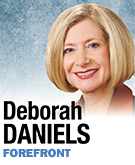Subscriber Benefit
As a subscriber you can listen to articles at work, in the car, or while you work out. Subscribe Now
 I lost a friend this summer.
I lost a friend this summer.
My law partner and longtime friend Joe Russell died suddenly at age 63 in July. Such a stunning event unleashes introspection: How could this happen to someone so young? How likely is it that I’ll keel over in the next year? Time to start planning vacations NOW.
But Joe’s death led to deeper considerations. You see, Joe Russell was what people used to call a “gentleman lawyer.” (I know what you’re thinking: That surely is an oxymoron.)
But in fact, the way Joe lived his life provided lessons for all of us. Lawyers learned from Joe that it is entirely possible to represent one’s clients zealously while treating other parties and their lawyers with respect and even friendship. Friends and opponents loved and admired him. (He was also one of the funniest guys you would ever hope to meet.)
Joe’s example also taught that, despite friendships between lawyers and judges, both must fully respect the need for fairness and impartiality in the system. Upon the appointment of his dear friend and colleague, Sarah Evans Barker, to the federal bench, Joe thereafter steadfastly referred to her as “Judge,” and while they maintained a close friendship for the rest of his life, he never crossed the invisible line between friendship and attempted influence.
Joe’s absolute belief in these principles has led the Indianapolis Bar Association to honor him with its annual Professionalism Award—this is perhaps the highest compliment any of us could hope to be paid.
But it is not only lawyers who should draw inspiration from Joe’s life.
Arthur Brooks of the American Enterprise Institute says there are two characteristics that allow political candidates to rise above petty politics and become true leaders: principle and tolerance. He could have been describing Joe Russell.
It is critical for a leader to know what he believes, and stand firmly on his principles. At the same time, one must be tolerant—respectful of the fact that others may disagree on principle and still be good, well-meaning people.
If President Obama were more like Joe, he’d seek consensus instead of speaking dismissively and pejoratively of those on the other side of the political aisle, even while ostensibly reaching across it.
If more members of Congress were like Joe, I am confident we would not have the gridlock we now suffer, and House and Senate Democratic leaders would not refer to those who disagree with them as “anarchists,” “fanatics” and “terrorists.”
If Indiana’s officeholders were more like Joe, we wouldn’t see politicians, unsatisfied with a mere win at the polls, seeking to ruin opponents’ reputations; or the intolerance demonstrated by some officeholders to, for example, the gay community.
We wouldn’t hear Hoosier candidates saying we need less bipartisanship; we’d see them seeking common ground with their political opponents for the benefit of us all.
If local politicians were more like Joe Russell, we wouldn’t see members of the City-County Council spiking reasonable mayoral proposals for political advantage. I’ve watched well-meaning councilors, including Democratic leaders, working with the mayor for the betterment of our community. But others make it as difficult for the council leadership as for the mayor to achieve progress.
If the political class were, collectively, more like Joe, more quality individuals would be willing to run for office—to enter what Teddy Roosevelt described as “the arena.”
I lost a friend this summer, but I hope his spirit will lead us all to become better people.•
__________
Daniels, a partner at Krieg DeVault LLP, is a former U.S. attorney, assistant U.S. attorney general, and president of the Sagamore Institute. Send comments on this column to [email protected].
Please enable JavaScript to view this content.
